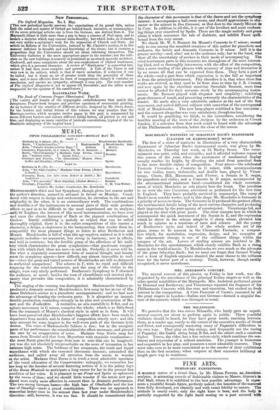MOSCHELES'S MATINEES OF SEBASTIAN BACH'S PIANOFORTE (CLAVIER OR HARPSICHORD) MUSIC.
The first of a series of matinees in illustration of a very characteristic department of Sebastian Bach's instrumental music, was given by Mr. Moscheles, on Thursday last week, at 76 Harley Street. The enter- tainment was quiet, solid, and scientific; and it afforded welcome repose at this season of the year, when the excitement of mechanical display usually reaches its height, by diverting the mind from practical feats to the more durable claims of composition. Four pieces—the celebrated Fantasia Cromatica ; a Concerto in G minor' with accompaniments for two violins, tenor, violoncello, and double bass, played by Vieux- temps, Conen, Hill, Hausmann' and Flower; a Sonata in E major, for pianoforte and violin; and a Concerto in D major, accompanied by the aforementioned miniature baud—constituted the whole entertain- ment, of which Moscheles as sole pianist bore the brunt. The novelties to us were the two Concertos, advertised as performed for the first time in England. They have probably survived in manuscript, like many of Bach's most notable works; and in this shape Mr. Moscheles is fortunate in a priority of access to them. The Concerto in D produced the greatest effect; the instrumental details being of the most curious character, and producing their impression by the pure agency of counterpoint. Tieuxtemps led, and played in the duet with great gusto. The clear staccato bow in which he accompanied the quick movement of the Sonata in E, and the expression which he threw in the solemn adagia in C sharp minor' elevated him much in opinion as a musician of taste and science. All the poetry of Beethoven's style, and indeed of the whole modem art of the piano, seems to be nascent in the Chromatic Fantasia; a composi- tion which, for modulation, expression, design, and its examples of the enharmonic change, is one of the sublimest things within the compass of the art. Lovers of sterling science are indebted to Mr. Moscheles for this entertainment, which clearly exhibits Bach as a rising name in the world of music. To Mendelssohn we owe much as the advocate of the great Sebastian Bach; but we must not forget that Samuel Wesley and a knot of English organists chanted the same theme to the selfsame tune for the better part of a century. Truth, however, though tardily recognized, is never unwelcome.


























 Previous page
Previous page